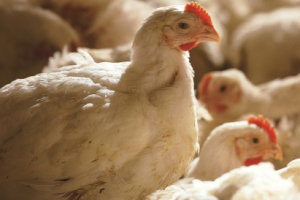Experimental vaccine to safeguard against fowl typhoid

Fowl typhoid is a widespread and devastating illness, particularly in the developing world, where the birds are a vital source of income and nutrition.
Researchers at Arizona State University have developed a candidate vaccine to safeguard poultry from fowl typhoid infection, while also providing protection from a related human bacterial strain – Salmonella Enteritidis.
“Fowl typhoid, caused by Salmonella Gallinarum, an avian-specific pathogen, accounts for about 10% mortality of chickens in the developing world, though this disease is often under-reported,” Ken Roland, Research Associate Professor in the Biodesign Institute’s Center for Infectious Diseases and Vaccinology, explains.
The group’s clever approach to immunisation relies on a modified strain of Salmonella Gallinarum that produces a robust immune response in Rhode Island Red chickens, similar to that produced by the naturally-occurring pathogen. Once a strong, system-wide immune response has been elicited however, a built-in mechanism disables the gene responsible for bacterial virulence. The technique provides better protection from fowl typhoid compared with existing vaccines, while also offering an increased level of safety.
Salmonella Gallinarum, causative agent of fowl typhoid, attacks birds of all ages, particularly broiler parents and brown-shell egg layers. While chickens are most commonly affected, the disease can also infect many other types of birds, including turkeys, game birds, bullfinches, guinea fowls, sparrows, parrots and canaries.
Fowl typhoid is responsible for widespread morbidity and mortality in poultry, particularly in Africa, Asia, Europe and Latin America.
“In many developing countries, chickens represent far more than just a food source, although it is typically the primary source of animal protein,” Roland says. “The free-range flock scenario exposes these birds to diseases carried by the wild bird population, which includes fowl typhoid. Increasing the quality and productivity of backyard chicken will thus provide an immediate impact on the quality of life of the rural poor.”
The study indicates that delayed-attenuation Salmonella vaccines of the kind explored can have wide applicability for the effective protection from a range of infectious diseases. In future efforts, the group hopes to fine-tune a vaccine strain with more than one attenuating mutation, at least one of which remains unaffected by dietary components, thereby offering improved safety along with maximum immunogenicity.
“Our goal,” Roland says, “is to utilize ‘high-tech’ strategies to provide a ‘low-tech,’ easy-to-use, inexpensive vaccine, allowing everyone from backyard farmers to commercial hatcheries to vaccinate their flocks, resulting in better food security in the developing world.”
The group’s research results recently appeared in the journal Vaccine.













